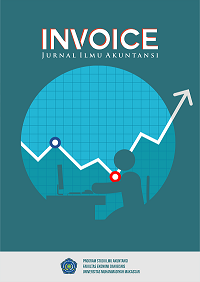The Influence of the Technology Acceptance Model (TAM), E-System and the Role of the Account Representative on Taxpayer Compliance at West Makassar KPP
DOI: https://doi.org/10.26618/inv.v6i2.14012
Abstract
This research investigates the influence of the Technology Acceptance Model (TAM), E-System, and the Role of the Account Representative on taxpayer compliance at the West Makassar KPP. The study's population consists of all taxpayers registered at the West Makassar KPP, with a sample size of 88 taxpayers selected for analysis. To ensure the validity and reliability of the questionnaire results, thorough testing was conducted, including classical assumption tests such as normality, multicollinearity, and heteroscedasticity. The primary analytical method employed is multiple linear regression analysis. The findings reveal that the Technology Acceptance Model (TAM) exerts a significant positive impact on taxpayer compliance, indicating that when taxpayers perceive technology as beneficial and user-friendly, they are more likely to comply with tax regulations. Conversely, the E-System demonstrates a significant negative effect on taxpayer compliance, suggesting potential issues with its implementation or usability that hinder compliance. Furthermore, the role of the Account Representative is found to have a significant positive effect on taxpayer compliance, highlighting the importance of personal interaction and support in facilitating tax compliance. Overall, the study emphasizes the critical factors influencing taxpayer compliance, providing insights that could inform policy decisions and the development of strategies to enhance compliance at the West Makassar KPP. These findings are crucial for improving tax administration and ensuring greater adherence to tax obligations among registered taxpayers.References
Desyanti, & Amanda, L. (2020). The Influence of Tax Knowledge and Implementation of the Tax E-System on Taxpayer Compliance at KPP Pratama Gresik Utara. Journal of Accounting Science and Research , 9 (4), 1–25.
Depi, S., Rachman, S., Yuliani, N. F., Tahalua, I., & Marsuni, N. S. (2024). Strengthening Individual Taxpayer Compliance: The Impact of Tax Sanctions and Regulatory Review. Amnesty: Jurnal Riset Perpajakan, 7(1), 138-145.
Irawan, R., & Sadjiarto, RA (2013). The Influence of Account Representatives on Taxpayer Compliance at KPP Pratama Tarakan. Tax & Accounting Review , 3 (2), 1–12.
Lannai, D., & Junaid, A. (2022). Analysis of the Implementation of an Electronic (Online) Tax System in Increasing Taxpayer Compliance at the West Makassar KPP. Journal of Accounting and Finance (JAF) , 3 (2), 58–73. http://pasca-umi.ac.id/index.php/jaf/article/view/934/1006
Marsuni, N. S. (2023). The Effect of Tax Incentives and Tax Education on MSME Taxpayer Compliance During The Covid-19 Pandemic. GoodWill Journal of Economics, Management, and Accounting, 3(1), 22-25.
Marsuni, N. S. (2022). Tax Governance in the NFT Ecosystem and Metaverse. GoodWill Journal of Economics, Management, and Accounting, 2(1), 14-17.
Marsuni, N. S., & Insirat, M. N. Tax Strategy to Encourage MSME Growth: Analysis of Effectiveness and Constraints.
Nurwanah, A., & Ahmad, H. (2021). The Effect of E-Invoicing's Convenience and Benefits on Taxpayer Compliance with Internet Understanding as a Moderating Variable. Amnesty: Journal of Taxation Research , 4 (1), 34–47. https://doi.org/10.26618/jrp.v4i1.5305
Rachmawati, AD (2014). The Influence of Account Representative (AR) on Taxpayer Compliance (Study at KPP Pratama Kepanjen). Brawijaya University .
Knight. (2019). The Influence of Taxpayer Behavior on E-Filing Users in Makassar City . Indonesian Muslim University.
Sugiyono. (2016). Quantitative, Qualitative, R&D Research Methods . Alphabet.
Sukrisno, A., & Estralita, T. (2017). Tax Accounting (ES Suharsi (ed.); 3rd ed.). Salemba Four.
Sunyoto, D. (2013). Accounting Research Methods (1st ed.). Refika Aditama.
Suratningsih, NP, & Merkusiwati, NKLA (2018). The Effect of Implementing the E-Filling System and the Role of Account Representatives on Individual Taxpayer Compliance. Udayana University Accounting E-Journal , 24 (2), 1220–1247. https://ojs.unud.ac.id/index.php/Akuntansi/article/view/38913
Susmita, PR, & Supadmi, NL (2016). The Influence of Service Quality, Tax Sanctions, Tax Compliance Costs, and Implementation of E-Filing on Taxpayer Compliance. Udayana University Accounting E-Journal , 14 (2), 1236–1269.
Tambun, S., & Muhtiar, I. (2019). The Influence of Tax Knowledge and Application of E-Systems on Taxpayer Compliance Moderated by the Technology Acceptance Model. Tax Accounting Media , 4 (1), 1–15.
Wahyuni, N., & Susuanto, E. (2021). Evaluation of Taxpayer Compliance Before and After the 2009 Tax Reform. YUME: Journal of Management , 4 (2), 125–137. https://doi.org/10.37531/yume.vxix.343
Widjaja, H., & Siagian, AJ (2017). Analysis of the Implementation of the Tax E-System for Individual Taxpayers on the Implementation of the Self-Assessment System in Fulfilling Tax Obligations. Journal of Economics , 22 (3), 440–447. https://doi.org/10.24912/je.v22i3.279
Downloads
Published
Issue
Section
License
Authors who publish with Invoice: Jurnal Ilmu Akuntansi agree to the following terms:
-
Copyright Ownership
The copyright of all articles published in this journal remains with the author(s). However, the authors grant Invoice: Jurnal Ilmu Akuntansi the right of first publication with the work simultaneously licensed under a Creative Commons Attribution 4.0 International License (CC BY 4.0). This license allows others to share, copy, redistribute, adapt, and build upon the work for any purpose, even commercially, as long as proper credit is given to the original author(s) and the source. -
Licensing and Access
Invoice: Jurnal Ilmu Akuntansi provides immediate open access to its content on the principle that making research freely available to the public supports a greater global exchange of knowledge. All published materials are available freely without subscription or payment and can be accessed, downloaded, and reused by any user provided that appropriate attribution is given. -
Permission for Reuse
For uses not covered by the CC BY 4.0 license, such as commercial reprints, translations, or any form of adaptation without clear attribution, users must obtain written permission from the editorial team. Requests for such permissions can be directed to the editorial office at: [invoice@unismuh.ac.id]. -
Plagiarism and Originality
Authors are responsible for the originality of their submissions. All articles are screened for plagiarism using appropriate tools before acceptance. Manuscripts found to contain unoriginal content or infringing materials will be rejected or retracted as per journal policy.















